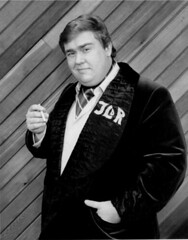 As the world hyperventilates over the firing of Don Imus for his disgusting characterization of women basketball players as “nappy-headed hos,” I am losing my breath over something else: cheap tricks.
As the world hyperventilates over the firing of Don Imus for his disgusting characterization of women basketball players as “nappy-headed hos,” I am losing my breath over something else: cheap tricks.
Not the band nor the services provided by the type of “hos” Mr. Imus so lovingly described on the air. I speak of lazy writers and artists who tack on a surprise ending or bogus conclusion to their work.
This is something that gets me really, really, really, really, really, really pissed off, much more than any “ho” talk ever would.
Wife claims that this is what ultimately marred “Special Topics in Calamity Physics.” Bad, stupid twists at the end can ruin what might have been an excellent book. Such endings are about as believable as Richard Gere going for Julia Roberts, the ho-with-a-heart-of-old, in “Pretty Woman.”
In beginning writing workshop classes, the ho running it often will begin with the edict, “You can never begin or end a story with a dream.” In other words, “It was all a dream!” is verboten.
I would add to that no surprises that add nothing or do not rise organically from the plot, that are done for shock value, and that involve hos. There are three instances that have gotten me so mad that you’d think someone had taken away my beer-making kit.
1. The ending of “Magnolia.” Frogs from the sky? This is how everything is tied together, as promised from the film’s prologue? Tom Cruise stars as a ho.
2. The first season of “24.” Wife and I rented this acclaimed series, and despite the ludicrousness of it all, enjoyed it until near the end, when an agent is suddenly — and I mean suddenly — unmasked as a double-crossing ho. (Other hos abound in “24,” mostly men). It gave new meaning to “came out of nowhere” and “it totally sucked ass. I mean totally.”
Imus: just say ho
3. A movie called “Swimming Pool.” There are two reasons to see this movie. First is Charlotte Rampling’s terrific performance. Second is that Ludivine Sagnier, under the pretense of being a free-spirited French ho, is topless for about half the movie (looked great on screen!).
But the ending — which I without any hesitation I reveal here in the hope it will persuade someone not to rent it — is that the action of the movie didn’t “exist!” It was the plot of a book — called “Swimming Pool”! — that Rampling is delivering to her publisher! It was all a dream, you stupid hos in the audience!
What ties these together is that all of them throw in bogus, ho-like surprises at the end that were dreamed up for an Encyclopedia Jones or Nancy Drew mystery. Also, at the end of all of these entertainments, I had the urge to attack the television with a blunt object.
As for fiction, there are as many craptastic surprises in novels as there are corporate and right-wing hos in the White House.
You might blame it on O. Henry (or “Ho. Henry,” as he was affectionately known), who was renown for his surprise endings to stories. His most famous story, “The Gift of the Magi,” concerns a couple, neither of whom are hos, but whose love for each other leads them to sacrifice their most precious possession.
This kind of surprise ending turns “The Gift of the Magi” into an anecdote, and it can have the same effect on any book, film or television show. Fiction becomes a punch line, worse than any stand-up ho desperate for laughs.
For instance, a one-page science fiction story whose provenance and title escapes me. In it, all the computers in the universe are networked together. At the triumphal press conference, attended by media-hos from around the galaxy, the lead scientist solicits questions from the crowd to ask the computer. “Is there a God?” someone queries, and the computer instantly replies, “There is now.” Horrified, the scientist leaps for the off switch, only to be struck down by lightening.
I admit there were two things I liked about "Swimming Pool"
You don’t have to rush to the library to find it. It’s an anecdote, not a story. (And it feels like I just ho-ed myself out to tell it to you.)
Why does this get me so angry? I don’t know why. Perhaps because I can probably conjure about 20 better endings to any one of these books or movies than are presented. I didn’t get the opportunity to publish a novel with a implausible, flashy ending designed to impress the reader.
But I wouldn’t do such a thing. No, the math is simple. You won’t find such attention-grabbing, sleazy writing from this here ho.
Friday, April 13, 2007
The Cheapest Trick in the Book, or How to Be a Ho
Subscribe to:
Comment Feed (RSS)


|